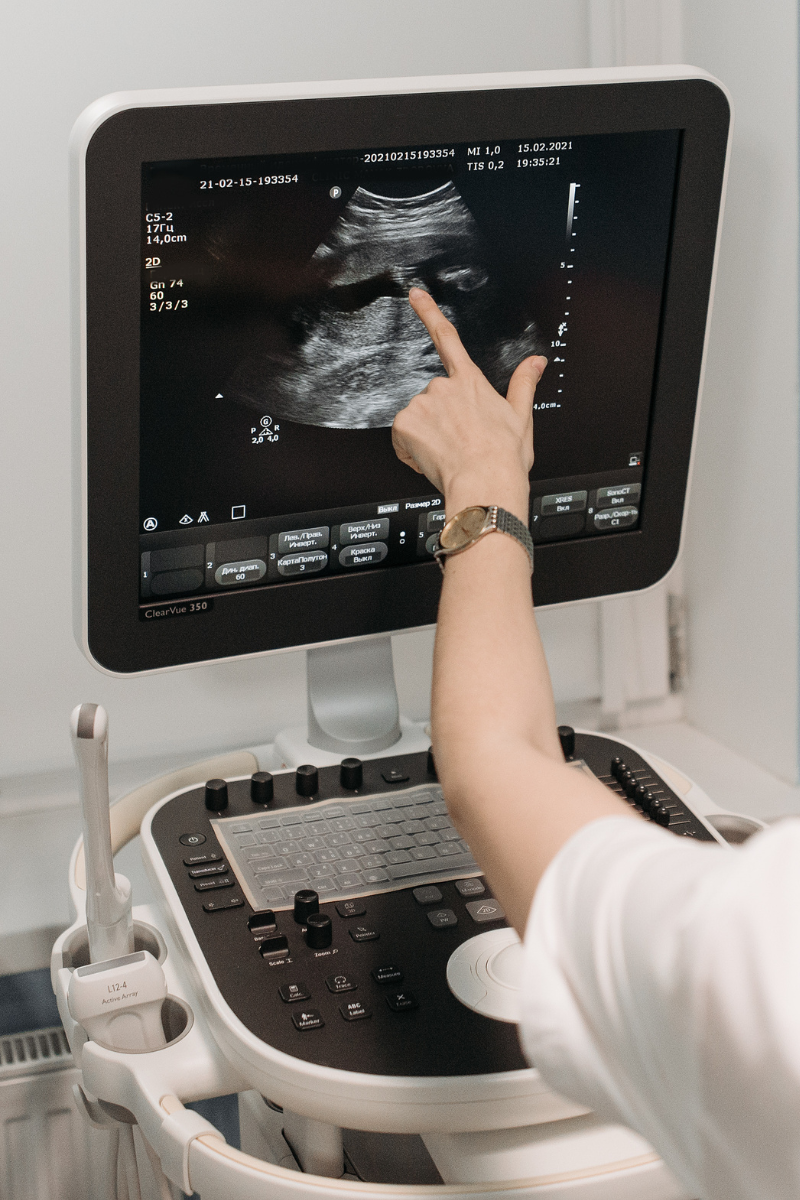Published: October 10, 2024
Is Your Pregnancy High Risk? What You Need to Know
Pregnancy is an exciting time for many families, but for some, it may bring additional risks. When certain conditions complicate a pregnancy, it’s referred to as a high-risk pregnancy, which means that special care is necessary to help both the pregnant person and baby stay healthy. At Elliot Hospital, our maternal-fetal medicine specialists (MFM) provide comprehensive prenatal care, working closely with expectant people whose pregnancies fall into this category to guide them through challenges with the right expertise, monitoring, and treatment.
So, what exactly makes a pregnancy high-risk, and what should you expect if you receive this diagnosis?
What is a High-Risk Pregnancy?
A pregnancy is considered high-risk when there are factors that could potentially endanger the health or well-being of the pregnant person, baby, or both. These risk factors could stem from pre-existing medical diagnoses, a variety of fetal conditions, or other complications that arise during pregnancy.
Dr. Bethany Hart, medical director of Maternal Fetal Medicine at The Elliot, explains, "High-risk pregnancies can range in level of risk. While ‘high-risk’ doesn't necessarily mean something will go wrong, it may mean that we need to provide extra care and monitoring to reduce the chances of complications in your pregnancy. We will also work to develop an individualized patient-centered plan if complications arise."
Learn more about care from our maternal-fetal medicine team
How Pre-existing Medical Conditions Affect High-Risk Pregnancy
For many people, a high-risk pregnancy is linked to pre-existing medical conditions. Maternal fetal medicine providers at The Elliot provide a range of care to improve pregnancy outcomes for those with potential risk factors in pregnancy. This may include meeting with you before pregnancy or in the early stage of pregnancy to construct a detailed, individualized care plan.
Working with an MFM specialist helps ensure that both the underlying condition and the pregnancy are being addressed at the same time.
Some examples of underlying medical conditions we treat include heart diseases, lung problems, autoimmune disorders, infectious diseases, cancer, and genetic, blood, kidney, neurological or psychiatric conditions.
Common Pregnancy Complications in High-Risk Pregnancies
Even if you don’t have a pre-existing condition, complications can still develop during pregnancy. Some of the most common pregnancy-related complications include:
Preeclampsia: This condition involves high blood pressure and other changes related to the pregnancy and can pose significant risks to both the pregnant person and baby if left untreated. Recognizing preeclampsia symptoms early is crucial for managing a high-risk pregnancy effectively.
can pose significant risks to both the pregnant person and baby if left untreated. Recognizing preeclampsia symptoms early is crucial for managing a high-risk pregnancy effectively.
- Preterm labor or premature rupture of membranes
- Bleeding or placental problems
- Twins or higher order multiple gestations
- Fetal growth problems, birth differences, or genetic conditions
- Cervical insufficiency, fetal loss, and recurrent miscarriages
The Role of Maternal-Fetal Medicine in High-Risk Pregnancies
So, what can you expect if your pregnancy is considered high risk? The first step is often a referral to a maternal-fetal medicine specialist, who will work alongside your regular OB-GYN to provide specialized prenatal care.
Dr. Jean Hostage, an Elliot maternal fetal medicine provider explains, "Our goal as maternal-fetal medicine specialists is to support the health of both the mother and baby. We use advanced diagnostic tools, like ultrasound and fetal monitoring, to assess and track the health of the pregnancy."
You may need more frequent prenatal care visits with your OB provider, additional ultrasounds, or specialized tests, to gather more information about you or your baby’s health or condition. If necessary, your care plan might also include changes in medications and closer monitoring of your health condition.
The team approach is key to ensuring the best possible outcomes. MFM specialists collaborate with other healthcare providers, including nutritionists, genetic counselors, and pediatric specialists, to create a comprehensive plan that addresses all aspects of the pregnancy.
How to Take Care of Yourself During a High-Risk Pregnancy
If you are diagnosed with a high-risk pregnancy, you may feel anxious or overwhelmed. However, there are steps you can take to protect your health and reduce the chances of complications:
Attend all prenatal care appointments: These visits allow your healthcare provider to monitor the pregnancy and address any concerns as they arise.
Follow medical advice: Whether it’s taking prescribed medications, adjusting your diet, or having frequent monitoring, following your doctor’s recommendations is essential.
Manage your stress: Pregnancy can be a stressful time, especially if it’s high risk. Find healthy ways to manage stress, such as practicing mindfulness, engaging in light physical activity (as approved by your doctor), and seeking support from friends or a counselor.
Stay informed: Understanding your condition and what to expect can help alleviate some of the anxiety surrounding a high-risk pregnancy. Don’t hesitate to ask your healthcare team questions.
Looking Ahead
A high-risk pregnancy can be challenging. At Elliot Maternal Fetal Medicine in Manchester, NH, our team of highly qualified providers will guide you through every step of your journey in a compassionate and supportive environment.
If you believe your pregnancy may be high risk, talk to your healthcare provider about specialized prenatal care. The earlier you seek specialized prenatal care, the better your chances of a successful pregnancy.
If you're seeking specialized prenatal care in the Manchester, NH area, contact Elliot Maternal Fetal Medicine today to schedule a consultation.
Learn more about care from our maternal-fetal medicine team
 Dr. Bethany Hart is the medical director of Maternal Fetal Medicine at Elliot. She is a diplomate of the American Board of Obstetrics and Gynecology with certification in Maternal Fetal Medicine. She is a fellow of the American College of Obstetricians and Gynecologists. She completed her fellowship training at the University of Minnesota in 2016. Her focus is providing compassionate and personalized care for patients with a wide range of maternal and fetal complications.
Dr. Bethany Hart is the medical director of Maternal Fetal Medicine at Elliot. She is a diplomate of the American Board of Obstetrics and Gynecology with certification in Maternal Fetal Medicine. She is a fellow of the American College of Obstetricians and Gynecologists. She completed her fellowship training at the University of Minnesota in 2016. Her focus is providing compassionate and personalized care for patients with a wide range of maternal and fetal complications.

Dr. Jean Hostage is a diplomate of the American Board of Obstetrics and Gynecology with certification in Maternal Fetal Medicine and is a fellow of the American College of Obstetricians and Gynecologists. Her clinical interests include medical complications of pregnancy, prenatal diagnosis, substance use disorders, and cervical insufficiency.
